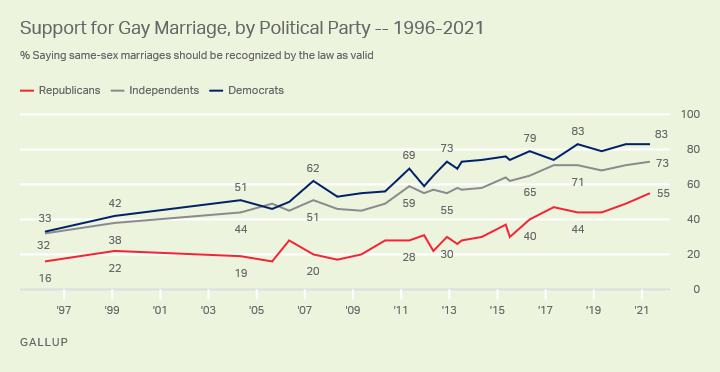Which Political Victories Cause Backlash?
Four years ago I wrote Trump: A Setback For Trumpism, pointing out that when Trump became president, his beliefs became much less popular. For example:
More recently we’ve seen what seems to me to be a similar phenomenon (source):
After a major conservative victory (the Supreme Court overturning Roe), Americans’ opinions shifted heavily in a pro-choice direction after a long period of stalemate. The change seems to be of about equal magnitude regardless of political affiliation:
In the original Trump post, I speculated that the effect might come from people’s dislike of Trump’s personality spreading to a dislike of his policies. I don’t think that can be true here - the abortion ruling was a straightforward policy change with no extra personality component.
One natural alternative theory is a thermostatic effect. Voters want some medium amount of abortion, so if they hear that pro-abortion forces are winning, they say they’re against abortion. But if they hear that anti-abortion forces are winning, they say they’re pro-abortion.
The problem is, I can’t really find this effect for recent Democratic victories. For example, in 2015 the Supreme Court ruled (in Obergefell) that gay marriage was legal. On a thermostatic picture, one might have expected the public to turn against gay marriage. Here’s the data (source):
There is no clear turn against gay marriage in 2015.
Obamacare was passed in 2010. How did it affect people’s opinion of government-run health care? More data (source):
No effect.
What’s going on?
Maybe the public backlashes against conservative victories, but not liberal ones? Why would that be? Maybe because liberals control more of the media than conservatives; when conservatives win something, the media does a good job making everyone panic that conservative ideas are taking over, and convinces them to do a thermostatic reaction. But when liberals win something, most people either don’t hear about it or don’t hear anyone telling them to worry, so they don’t. Or maybe it’s because liberalism is “on the right side of history”, ie the direction things naturally tend, so nobody finds liberal victories surprising, whereas everyone finds conservative victories surprising and feels like they need to react against them.
Maybe it has to do with how quickly people can find a case of the new law going wrong? My impression of the post-_Dobbs_ debate on abortion was that it centered on an incredibly sympathetic 10-year-old rape victim from Ohio who really needed an abortion but was having trouble getting one - a few stories like that can probably move opinion a lot. In contrast, even if Obamacare causes budget deficits or whatever, it’s harder to find a specific victim. This doesn’t quite fit the free trade vs. protectionism example though, although it fits some other Trump issues like deportation.
Or maybe this is totally random and I shouldn’t try to conclude things from n = ~5 examples. But I’m still confused why the Trump and abortion backlashes were so noticeable, and don’t feel like I have any strong predictions to give on whether some other policy victory will produce a backlash or not.




